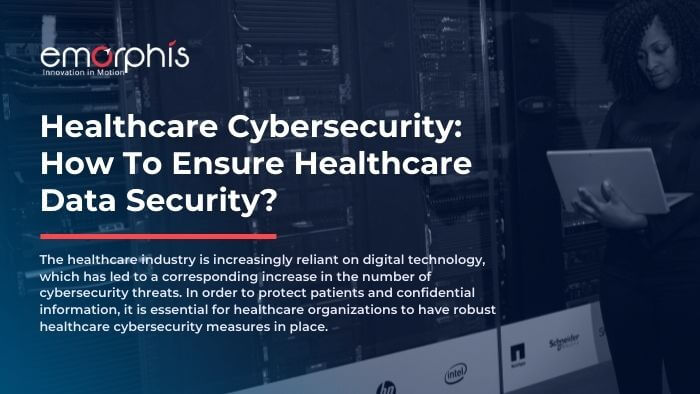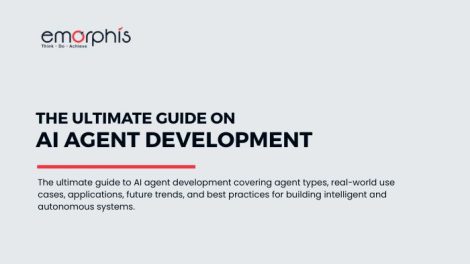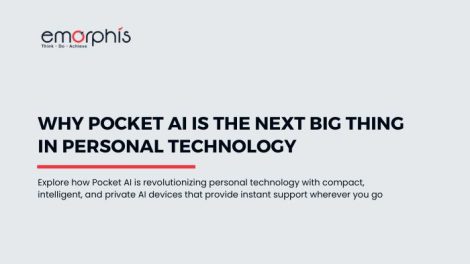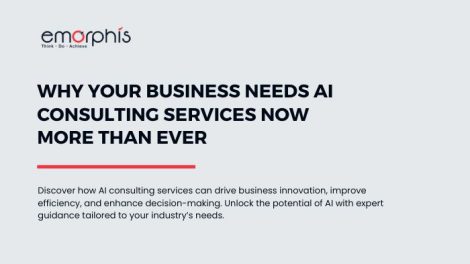Overview
The healthcare system worldwide has been undergoing drastic changes in how it functions over the past few years. Healthcare cybersecurity is becoming increasingly important. With the ongoing pandemic, and the complete healthcare system going online. It also carries the potential risk of personal and confidential data being hack or leak into the public domain. In the field of healthcare, sensitive data can be categorized into patient information, medical billing services, and a lot more falls at stake.
However, in recent times, the number of healthcare applications has been under the spotlight due to the several perks they carry along. Now, with the healthcare system upgrading itself to being available to people at their fingertips. The very point of security and data encryption comes into play with the recent rise in global cyber security breaches globally.
What Is Healthcare Cybersecurity?
All living things, including humans, plants, animals, the environment, and space itself, depend on good health. The anxiety about safety is growing, as is the concern over everyone's security. Healthcare data security is an important element of the Health Insurance Portability and Accountability Act Rules (HIPAA).
According to the HIPAA Security Rule, covered companies must evaluate data security controls. It is through risk analysis and implementing a risk management program to remedy any vulnerabilities found.
Healthcare Cybersecurity is more crucial than ever, as cyberattacks on healthcare businesses are on the rise. The healthcare sector has become one of the most targeted industries for cybercrime. Furthermore, hackers are developing more advanced tools and tactics for attacking healthcare businesses.
Additionally, HIPAA-covered organizations are required to put in place the proper administrative, physical, and technical protections. This is to guarantee the availability, confidentiality, and integrity of electronically protected health information. Under HIPAA compliance, healthcare applications are bound to safeguard and protect the data of patients. Their billing details, the person related to patient care, their insurance details and previous records, prescription history, and also the people and organizations that have access to these details.
Any healthcare app developer should also keep in mind the HL7 compliance guidelines, which focus on the exchange, sharing, retrieval, and integration of any kind of electronic healthcare data.
Why Is Healthcare Cybersecurity Needed?
There are two types of apps in healthcare. One of which is for healthcare providers that are integrated with electronic devices and records platforms to store radiology, laboratory, or other patient data for coordinated care. The other type of mobile healthcare application is individual or private apps that track and manage health statistics such as heart rate, steps, diabetes, blood pressure, calorie counter, etc. And also there are free apps available that tracks individual statistics and have certain ads along with them. “Free” looks amazing, isn’t it? But these apps share your data with the advertisers and you may not know what data is being shared. And, it is illegal as per HIPAA.
Did you ever verify if the free app you were given was HIPAA compliant? Well, the only mobile healthcare apps that are regulated under HIPAA are the ones provided by your healthcare provider as they are data encrypted.
Some of the top threats to healthcare data include:
- Unauthorized access
- Ransomware
- Phishing
- Mobile devices
- Dedicated denial of Service
For various reasons, data encryption is crucial for enterprises across all sectors and geographies. Businesses must safeguard user and customer information to prevent loss, theft, and eventual misuse.
Another essential step to avoiding the reputational cost associated with a data breach is data cybersecurity. Customers may lose faith in a company due to a high-profile breach or data leak and choose to do business with a rival. Along with penalties, legal expenses, and damage restoration, the prospect of significant financial losses exists if sensitive data is lost.
How To Approach A Sturdy Healthcare Cybersecurity Program?
As of now, it is evident that a strong data security regime in the healthcare sector is crucial for various reasons.
Now, let's look at some important steps to approach a secure data security program.
1. Meeting Regulatory Compliances like HIPAA, GDPR
Any application that processes, maintains, also transfers personally identifiable health information (PHI) must adhere to HIPAA regulations. To comply with HIPAA standards, it is necessary to follow privacy and also security rules that safeguard data through best practices in three areas, primarily administrative, physical, and technical security. In fact, both of these standards demand that developers have certain technological mechanisms to guarantee adherence to the rules.
HIPAA checklist includes
- Controlling/monitoring physical access
- Tracking EPHI devices
- Encrypt and authenticate EPHI
- Control log access and changes
- Document security incidences
- And a lot more administrative protection
Health data must always be safeguarded, with access to it being limited, and healthcare app developers guarantee its integrity. Additionally, developers must offer secure data transmission between parties and follow strict authentication procedures and secret credential requirements.
2. Implement High-Level User Validation And Authorization
User authentication, which uses passwords, credentials, tokens, also other unique methods of identifying users, offers the first line of defense in terms of security. In fact, it is essential to any healthcare app development process that involves data transmission. Including medical app development which is trending like Telemedicine app development solutions still, because healthcare software applications must maintain a high data encryption standard, it is much more important in these contexts. On the other side, authorization controls what data a user may access after logging in, which also harps on the concept of data access control.
3. Conduct Thorough Testing Of Healthcare Apps
The quickest way to destroy an app's reputation and the organization is that to develop it is to release a buggy or incomplete application. Security testing is necessary in addition to routine quality assurance testing in order to confirm the security of mobile medical applications in particular.
As a matter of fact, application flaws, incorrect setups, unsafe end-user behavior, and vulnerabilities in operating systems and services are all targets of security testing.
4. Request A Team Of Long-term Supporters
To stay current with technical improvements and potential security flaws, every developed software must be maintained. This is especially true for mobile medical app development like telehealth app development, given how quickly the sector is developing and changing.
Following the deployment of a healthcare app, support workers should monitor all critical lifecycle data, and get alerts on resource utilization and security threats. And make sure that the most recent versions of libraries are in use to provide a smooth user experience.
5. Using User Authentication To Secure An Application
Applying multi-factor authentication is an easy approach to safeguard any program against unwanted usage or entrance (MFA) for healthcare cybersecurity. Hence, users only permit admittance using MFA for access control, after successfully presenting various forms of identification that prove their rightful access to an app's data. When a user's device is lost or stolen, MFA is very helpful in preventing unwanted access to the data.
Two-factor authentication is another versatile means of ensuring that only authorized users have access to data (2FA).

Advantages Of A Resilient Healthcare Data Security Program
A. Reduced Chances Of Medical Errors
One of the greatest advantages of medical digitalization is the use of Electronic Healthcare Records (EHRs), but this can be dangerous in the absence of trustworthy cybersecurity. Today, healthcare integration is most common and hence data security program is essential to put in high priority while reducing the chances of medical errors. With these EHR data compromised, practitioners' ability to obtain crucial patient information may be restricted. Medical mistakes would more likely occur without quick and dependable access to EHRs.
B. Protecting Patient Privacy
Medical staff must abide by tight privacy laws when dealing with patient information. Thus it would be terrible if a hacker gained access to these documents in a hospital. It could reveal crucial information. Hence, healthcare apps must guarantee the data encryption of records due to their responsibility to protect patient privacy.
C. Safer Adoption Of Technology
Some people might be reluctant to use new technology since cybercrime seriously threatens hospitals and healthcare apps. The healthcare industry may expand much more quickly and speed up the process of patient care. Institutions may be reluctant to incorporate valuable technology because doing so would increase their vulnerabilities. It is with improved data security programs and the use latest technologies. Technologies like artificial intelligence, machine learning, IoT, and also healthcare applications like remote patient monitoring app development, and chatbots.
The use of linked technologies in the medical sector is increasing. This interconnectivity may make faster and more effective operations possible, but more endpoints also mean greater risk. Healthcare software development and applications must thus make sure that their medical device cyber security, healthcare information security, or IT security in healthcare is up to par. And also, robust enough to safeguard them from any risks or unauthorized access if they want to use these new medical gadgets safely.
D. More rapid patient care
Faster treatment would also be possible with enhanced medical cybersecurity, guaranteeing safer, more private care. EHRs enable doctors to begin therapy earlier when they're functioning properly, but errors can have the opposite impact. Even a mild hack can slow down a healthcare application a features full telehealth software development. These apps require trustworthy and also quick-working cybersecurity technologies to guarantee that their EHR systems operate as they should.
What Are The Focus Areas For Security Measures In Healthcare Apps?
Since the healthcare sector deals with sensitive and private data. Creating a safe medical mobile app that safeguards patient data while reducing liability risk for healthcare organizations and providers is essential.
When creating user-friendly, trustworthy, and secure healthcare software applications and solutions, several factors must be addressed. The following steps outline how to approach common data encryption methods in healthcare apps.
I. Conduct Research To Ensure Compliance With Regulatory Standards
Developers must be aware of any restrictions to their app before developing a mobile medical app. If the app is used by a significant number of medical professionals or if it is used at a facility that holds or transmits sensitive data, moreover, it's quite likely that it's subject to a set of regulations and standards. That must be followed for the healthcare app to be approved also as safe for broad usage.
II. Ensure Mobile App Security Through Data Encryption.
The implied agreement between healthcare app creators and app users includes trust in a significant way.
Patients are more likely to conceal important information from their healthcare providers if they are concerned about the confidentiality of their eHealth information. As a result, it becomes hard for clinicians to deliver high-quality treatment since they won't be able to believe that the data they have been given is full. Additionally, providers must safeguard themselves from the legal repercussions of violating patients’ privacy; as a result, they won't take part in a system that can't provide security and regulatory compliance.
III. Vulnerability Control
An app must contain protection against malware, including viruses, worms, keystroke loggers, and, backdoors, both at the time of launch and while updating the application.
IV. Conduct Thorough Testing Of Healthcare Apps
Security testing is necessary in addition to routine quality assurance testing in order to confirm the security of mobile healthcare applications in particular. Application flaws, incorrect setups, unsafe end-user behavior, and vulnerabilities in operating systems and services are all targets of security testing.
V. Authentication And Access Control
The app must include at least one widely used means for preventing identity theft. To prevent unauthorized access, remote access or privileged access should demand two-factor user authentication.
Conclusion
With the increase in cybercrimes and breaches in data security, the need for a resilient and strong data security regime is in demand. However, with the increasing number of healthcare applications globally, data security plays a crucial role in the application's reputation, followed by the trust put in by the users. Understanding the importance of data encryption and enforcing the best data security regime has seemed to aid in various forms of development in areas of patient care and data access control.
The latest guideline from HIPAA covered entities on data and device security, thus it is essential to follow such compliance and provide healthcare cybersecurity. Today, healthcare practices, organizations, and medical product development companies should have a specified budget and also hire an expert to assist them in making the appropriate arrangements in terms of healthcare cybersecurity. At Emorphis Technologies we follow various security compliances while developing healthcare software and applications. Get in touch with our healthcare experts for more details on healthcare cybersecurity. In fact, we at Emorphis Technologies provide digital transformation services in healthcare with the latest technologies for healthcare software development, and medical app development like telehealth and telemedicine.
Learn about various Healthcare Software Solutions and how these innovative medical software solutions are paving way for a bright future.







